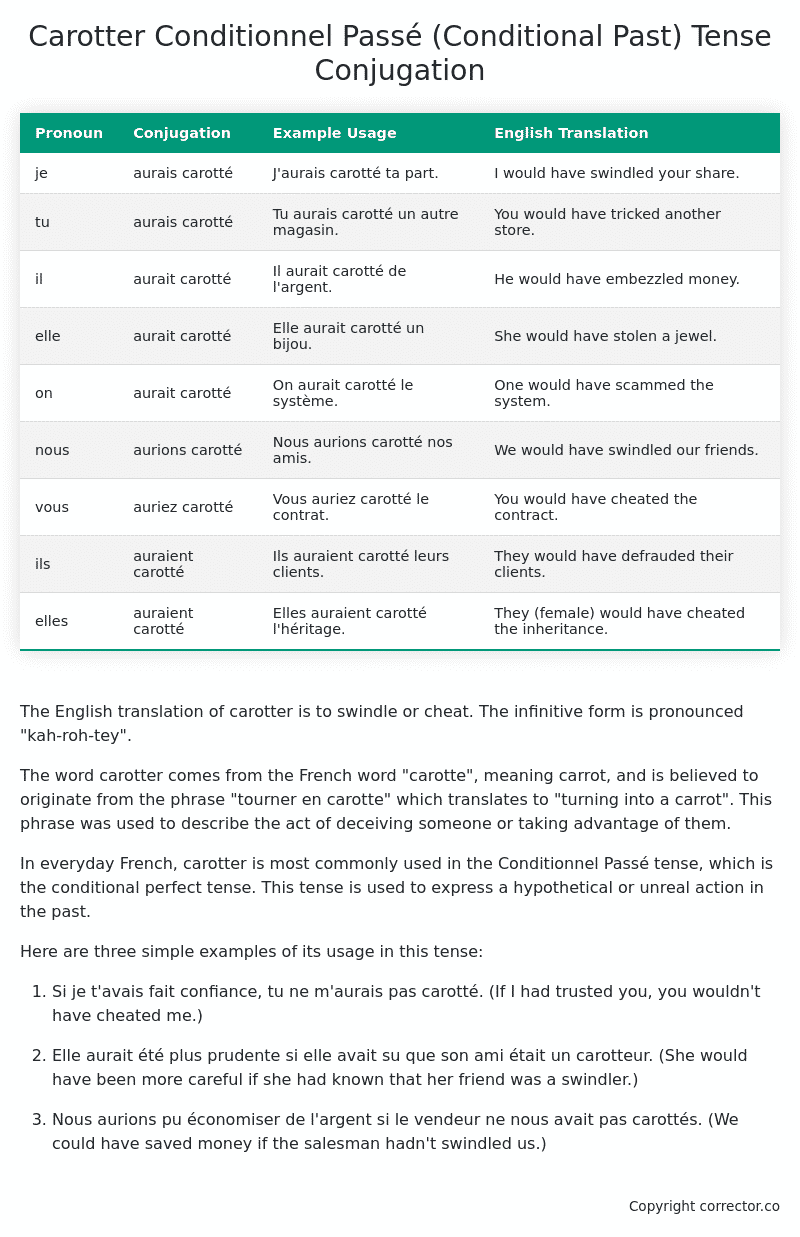Conditionnel Passé (Conditional Past) Tense Conjugation of the French Verb carotter
Introduction to the verb carotter
The English translation of carotter is to swindle or cheat. The infinitive form is pronounced “kah-roh-tey”.
The word carotter comes from the French word “carotte”, meaning carrot, and is believed to originate from the phrase “tourner en carotte” which translates to “turning into a carrot”. This phrase was used to describe the act of deceiving someone or taking advantage of them.
In everyday French, carotter is most commonly used in the Conditionnel Passé tense, which is the conditional perfect tense. This tense is used to express a hypothetical or unreal action in the past.
Here are three simple examples of its usage in this tense:
-
Si je t’avais fait confiance, tu ne m’aurais pas carotté. (If I had trusted you, you wouldn’t have cheated me.)
-
Elle aurait été plus prudente si elle avait su que son ami était un carotteur. (She would have been more careful if she had known that her friend was a swindler.)
-
Nous aurions pu économiser de l’argent si le vendeur ne nous avait pas carottés. (We could have saved money if the salesman hadn’t swindled us.)
Table of the Conditionnel Passé (Conditional Past) Tense Conjugation of carotter
| Pronoun | Conjugation | Example Usage | English Translation |
|---|---|---|---|
| je | aurais carotté | J’aurais carotté ta part. | I would have swindled your share. |
| tu | aurais carotté | Tu aurais carotté un autre magasin. | You would have tricked another store. |
| il | aurait carotté | Il aurait carotté de l’argent. | He would have embezzled money. |
| elle | aurait carotté | Elle aurait carotté un bijou. | She would have stolen a jewel. |
| on | aurait carotté | On aurait carotté le système. | One would have scammed the system. |
| nous | aurions carotté | Nous aurions carotté nos amis. | We would have swindled our friends. |
| vous | auriez carotté | Vous auriez carotté le contrat. | You would have cheated the contract. |
| ils | auraient carotté | Ils auraient carotté leurs clients. | They would have defrauded their clients. |
| elles | auraient carotté | Elles auraient carotté l’héritage. | They (female) would have cheated the inheritance. |
Other Conjugations for Carotter.
Le Present (Present Tense) Conjugation of the French Verb carotter
Imparfait (Imperfect) Tense Conjugation of the French Verb carotter
Passé Simple (Simple Past) Tense Conjugation of the French Verb carotter
Passé Composé (Present Perfect) Tense Conjugation of the French Verb carotter
Futur Simple (Simple Future) Tense Conjugation of the French Verb carotter
Futur Proche (Near Future) Tense Conjugation of the French Verb carotter
Plus-que-parfait (Pluperfect) Tense Conjugation of the French Verb carotter
Passé Antérieur (Past Anterior) Tense Conjugation of the French Verb carotter
Futur Antérieur (Future Anterior) Tense Conjugation of the French Verb carotter
Subjonctif Présent (Subjunctive Present) Tense Conjugation of the French Verb carotter
Subjonctif Passé (Subjunctive Past) Tense Conjugation of the French Verb carotter
Subjonctif Imparfait (Subjunctive Imperfect) Tense Conjugation of the French Verb carotter
Subjonctif Plus-que-parfait (Subjunctive Pluperfect) Tense Conjugation of the French Verb carotter
Conditionnel Présent (Conditional Present) Tense Conjugation of the French Verb carotter
Conditionnel Passé (Conditional Past) Tense Conjugation of the French Verb carotter (this article)
L’impératif Présent (Imperative Present) Tense Conjugation of the French Verb carotter
L’infinitif Présent (Infinitive Present) Tense Conjugation of the French Verb carotter
Struggling with French verbs or the language in general? Why not use our free French Grammar Checker – no registration required!
Get a FREE Download Study Sheet of this Conjugation 🔥
Simply right click the image below, click “save image” and get your free reference for the carotter Conditionnel Passé tense conjugation!

Carotter – About the French Conditionnel Passé (Conditional Past) Tense
Formation
Common Everyday Usage Patterns
Expressing Unreal Past Scenarios
Polite Requests or Suggestions
Expressing Doubt or Uncertainty
Interactions with Other Tenses
Conditional Present
Indicative Past Tenses
Conditional Future
Summary
Want More?
I hope you enjoyed this article on the verb carotter. Still in a learning mood? Check out another TOTALLY random French verb conjugation!


